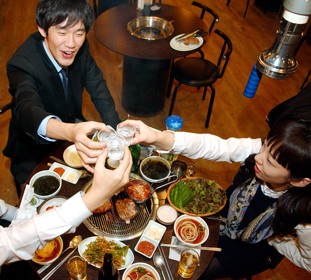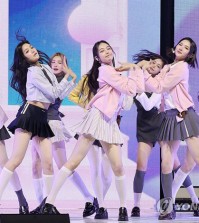- California Assembly OKs highest minimum wage in nation
- S. Korea unveils first graphic cigarette warnings
- US joins with South Korea, Japan in bid to deter North Korea
- LPGA golfer Chun In-gee finally back in action
- S. Korea won’t be top seed in final World Cup qualification round
- US men’s soccer misses 2nd straight Olympics
- US back on track in qualifying with 4-0 win over Guatemala
- High-intensity workout injuries spawn cottage industry
- CDC expands range of Zika mosquitoes into parts of Northeast
- Who knew? ‘The Walking Dead’ is helping families connect
It’s drink for success in South Korea!

A lot of Koreans believe that good drinking ability enhances closer relationship with their superiors at work. (Korea Times file)
By Choi Sung-jin
“If you are a good drinker, your work life will become much easier,” said 70 percent of salaried people in a recent survey by Saramin, a job portal.
In the multiple-response opinion poll, 74.6 percent of respondents said it is because good drinking ability would enhance personal intimacy with superiors, and 36.6 percent said drinking manners could also affect their office reputation.
An additional 30.6 percent noted drinking for business purposes can speed work proceedings, 28.2 percent said drinking capacity keeps workers from acting out of drunkenness, and 23.4 percent ascribed it to widespread preference for good drinkers in Korean society.
Particularly, 56.9 percent replied they have seen people get a favorable evaluation through wheeling and dealing at drinking parties rather than through job performance, and 20.7 percent said there is an atmosphere in which the bigger the drinking capacity of a person, the more capable he or she is regarded.
More than 80 percent of office workers feel like drinking: the largest share of 41.6 percent does so before days off, followed by 39.9 percent who face a heavy workload and 39.7 percent scolded by their bosses.
They drink on average 1.3 days a week and spend about 46,000 won ($36.70) a sitting. They took turns paying for drinks in 34.7 percent of cases, and on 30.5 percent of occasions, bosses or superiors took care of the bills. Some 17.9 percent adhered to Dutch treats every time while those who proposed first treated their colleagues in 12 percent of cases.
Drinking parties were stages for denouncing companies and complaining about work, in 45.8 percent of cases. They also talked behind absent colleagues’ backs (16.1 percent) and discussed office accidents and incidents (13.4 percent).
More than half of respondents, 55.5 percent, said they talked down their drinking capacity, for one reason for another.
Asked about the ugliest type in drinking parties, 26 percent cited people who coerce others to drink, followed by those who lay down the law (18.4 percent), those who have bad drinking habits (18.3 percent), fault-finders (13.6 percent) and those calling for changing places for second sprees (8.4 percent).















